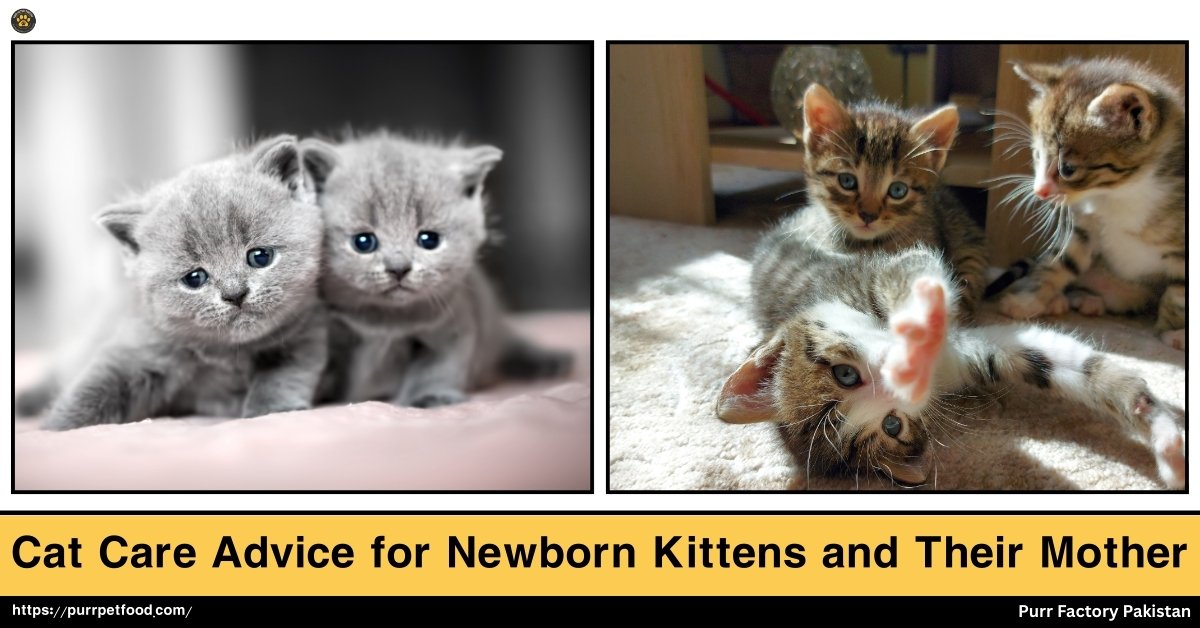Cat Care Advice for Newborn Kittens and Their Mother
Cat Care for newborn kittens and their mother is a crucial responsibility that requires patience, knowledge, and consistent attention.
When a cat gives birth, her kittens are born blind, deaf, and completely dependent on her for warmth, nutrition, and protection.
During the first few weeks, even small mistakes can have serious consequences for their health and survival.
As a caretaker, your role is to provide a safe, clean, and comfortable environment where the mother can focus on nursing and caring for her babies without stress.
Understanding the unique needs of both the mother cat and her kittens is essential.
From creating the perfect nesting area and maintaining the right temperature to ensuring proper feeding and hygiene, every step matters.
Additionally, recognizing early signs of health issues can prevent serious complications and save lives.
Cat Care Advice for Newborn Kittens and Their Mother
In this guide, we will explain step-by-step cat care tips, feeding schedules, health monitoring practices, and essential preparations to help you raise strong, healthy kittens while supporting the mother cat through her recovery and nurturing journey.

Preparing for the Birth
Preparation before the kittens arrive is crucial. A safe, quiet, and comfortable space will reduce stress for the mother and help her focus on giving birth and caring for her litter.
Choose a calm area away from loud noises, other pets, and heavy human traffic.
Use a large, shallow box or a secure cat bed to create a nesting space. Line it with clean, soft blankets or towels that can be changed easily.
Ensure the area is warm and free of drafts, as newborn kittens cannot regulate their body temperature.
Keep necessary supplies nearby, such as towels, a heating pad (set on low and covered with a blanket), shallow food and water dishes, and a litter box for the mother.
Also, have the contact information of a trusted veterinarian on hand in case of emergencies. A clean, organized setup for cat care ensures a smooth birthing process and minimizes the risk of infection or stress.
First Hours After Birth
The first hours after birth are the most critical for the kittens’ survival. Once each kitten is born, the mother will lick them to clean off fluids and stimulate breathing.
If the mother does not do this immediately, you may need to step in by gently rubbing the kitten with a soft towel.
Each kitten should begin nursing for cat care within one to two hours to receive colostrum, the first milk that contains antibodies vital for building their immune system.
During this time, avoid interfering unless necessary. Observe quietly to ensure the kittens are breathing normally, staying close to the mother, and actively nursing.
If a kitten appears weak, cold, or unresponsive, gently place it near the mother’s nipples and help it latch on.
Signs of trouble such as heavy bleeding, excessive crying from kittens, or difficulty breathing should be addressed by a veterinarian immediately.
Warmth and Temperature Control
Newborn kittens cannot generate or maintain their own body heat for the first few weeks. Without proper warmth, they can quickly become hypothermic, which is life-threatening. Maintain a steady, warm environment in the nesting area.
For the first week, keep the temperature between 85–90°F (29–32°C). During weeks two and three, slightly reduce it to around 80°F (26–27°C), and by week four, it can drop to 75°F (24°C).
Use a heating pad under half of the box or warm water bottles wrapped in towels to provide consistent heat.
Always leave part of the area cooler so the kittens and mother can move if they become too warm. Check the temperature regularly to avoid overheating.
Feeding the Mother Cat
The mother cat needs a nutrient-rich diet to recover from birth and produce enough milk for her kittens.
Feed her high-quality kitten food because it contains higher protein and calorie levels needed for milk production.
Place fresh water nearby at all times, as nursing cats require extra hydration. Offer multiple small meals throughout the day instead of one or two large portions to support her energy levels.
Keep her feeding area clean and separate from the nesting box to avoid contamination. A well-fed mother cat will have the energy to cat care for her kittens and produce sufficient milk to help them grow.
Feeding Newborn Kittens (If Mother Can’t Nurse)
In some cases, the mother may not be able to nurse due to illness, lack of milk, or rejection of the kittens. If this happens, you must take over feeding responsibilities.
Use a kitten milk replacement formula, never cow’s milk, as it can cause digestive problems.
Feed the kittens with a small bottle or syringe specifically designed for newborn animals. Always feed them on their stomachs, not on their backs, to prevent choking.
For the first week, kittens need to be fed every 2-3 hours, even at night. At two to three weeks old, feedings can be spaced to every four hours.
By four weeks, start introducing soft kitten food alongside formula.
After feeding, check that the kittens are calm and their stomachs are slightly full but not overly bloated. Consistent feeding is essential for steady growth and survival.
Helping Kittens Eliminate Waste
For the first two to three weeks, newborn kittens cannot urinate or defecate on their own. Normally, the mother stimulates elimination by licking their genital area. If the mother is unable or unwilling to do this, you must assist.
After each feeding, use a warm, damp cotton ball or soft cloth to gently rub the kitten’s lower abdomen and genital area.
This mimics the mother’s licking and encourages the kitten to relieve itself. Keep the area clean to prevent skin irritation.
If a kitten hasn’t eliminated waste for over 24 hours, seek veterinary advice immediately.
Health Monitoring
Monitoring the health of both the kittens and the mother is essential during the early weeks. Healthy kittens should be nursing regularly, gaining weight steadily, and showing signs of activity when awake.
A good indicator of health is daily weight gain ideally 10–15 grams per day.
Warning signs include constant crying, lethargy, lack of nursing, discharge from the eyes or nose, and breathing difficulties.
If you notice any of these symptoms, contact a veterinarian as soon as possible. For the mother, watch for excessive bleeding, fever, or loss of appetite, as these may indicate postpartum complications.
Early detection of problems can save lives and prevent long-term health issues.
Cleaning and Hygiene
Cleanliness is crucial to prevent infections and keep the kittens comfortable. Replace soiled bedding daily or as needed, and wash the nesting area regularly.
Use non-toxic cleaning products to avoid exposing the kittens to harmful chemicals.
Keep the mother cat’s litter box nearby but far enough from the nesting box to avoid contamination. Scoop it frequently to maintain hygiene.
For the mother, gently wipe her body with a warm, damp cloth if necessary, especially after birth. Avoid full baths during the nursing period, as they can cause stress and disrupt bonding.
Socialization and Handling
Proper socialization helps kittens grow into friendly, well-adjusted adult cats. However, handling them too soon can stress both the kittens and the mother.
During the first two weeks, limit handling to necessary cat care tasks like feeding or cleaning.
At three weeks, begin short, gentle handling sessions to get the kittens accustomed to human touch. Encourage positive interactions by speaking softly and providing a calm environment.
This early socialization will make future grooming, vet visits, and adoption transitions easier.
Veterinary Care
Veterinary checkups are essential for maintaining health. The mother cat should be examined within 24-48 hours after giving birth to ensure there are no complications like retained placenta or infection.
Kittens should have their first vet visit at two to three weeks old to check for congenital issues or early illnesses. Vaccinations typically start at six to eight weeks of age.
Your veterinarian will also recommend a deworming schedule and flea prevention plan. Regular veterinary cat care during the first few months sets the foundation for a lifetime of good health.
Transition to Solid Food
Weaning begins when kittens are around four weeks old. Start by introducing soft, wet kitten food mixed with formula to create a mushy consistency.
Offer small amounts several times a day while continuing bottle feeding.
Gradually reduce the formula as the kittens begin eating more solid food. By eight weeks, they should be fully weaned and eating independently.
Ensure that the food is high-quality and specifically formulated for kittens to support rapid growth and development.
Litter Training
Kittens naturally want to bury their waste, making litter training straightforward. Begin training around three to four weeks old. Use a shallow litter box with non-clumping litter to prevent accidental ingestion.
Place kittens in the box after meals and naps to encourage the habit. Keep the box clean to make it appealing. Most kittens will master litter box use by five to six weeks with consistent guidance.
Preparing for Adoption
If you plan to find new homes for the kittens, proper preparation is necessary. Kittens should stay with their mother until they are at least eight to ten weeks old.
This allows them to develop physically and learn important social behaviors.
Before adoption, ensure the kittens are fully weaned, dewormed, and have received their first vaccinations. Socialize them with humans and, if possible, other pets.
Provide potential adopters with health records and guidance on cat care to ensure a smooth transition.
Spaying and Neutering
Spaying and neutering prevent unwanted litters and contribute to better health for cats. The mother cat can be spayed once her kittens are weaned and she has recovered, usually around eight weeks after birth.
Kittens can be spayed or neutered between four to six months of age, depending on your veterinarian’s recommendation.
Early spaying and neutering also reduce the risk of certain diseases and behavioral problems.
Common Mistakes to Avoid
Certain mistakes can harm both the mother and kittens. Avoid these common errors:
- Feeding cow’s milk – It can cause digestive issues and dehydration.
- Neglecting warmth – Cold kittens cannot digest food properly or gain weight.
- Over-handling newborns – Can stress the mother and weaken the kittens.
- Delaying veterinary visits – Early detection of illness is critical.
- Separating kittens too early – Can lead to behavioral and health problems later.
By staying informed and attentive, you can prevent these mistakes and support healthy development.
Conclusion
Caring for newborn kittens and their mother is a journey that requires patience, dedication, and knowledge.
The first few weeks of life are critical, as kittens are completely dependent on their mother for warmth, nutrition, and protection.
Your role as a caretaker is to create a safe, clean, and stress-free environment where the mother can focus on nursing and recovery while the kittens grow strong and healthy.
By ensuring proper warmth, regular feeding, and maintaining hygiene, you set a solid foundation for their well-being.
Timely veterinary visits are essential to monitor health, prevent diseases, and address any complications early.
As the kittens grow, gradually introduce solid food, begin litter training, and encourage gentle socialization to prepare them for independent living.
If rehoming is planned, wait until the kittens are at least eight to ten weeks old to ensure they are physically and emotionally ready.
Finally, consider spaying or neutering both the mother and kittens to prevent unwanted litters and promote long-term health.
With careful attention and consistent cat care, you can guide these tiny lives through their most vulnerable stages and help them thrive into happy, healthy adult cats.
